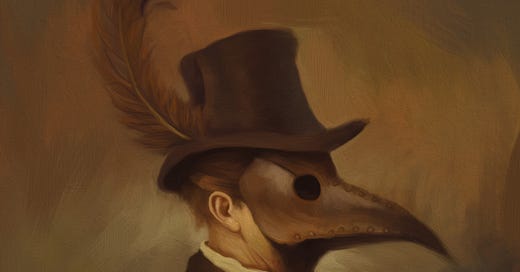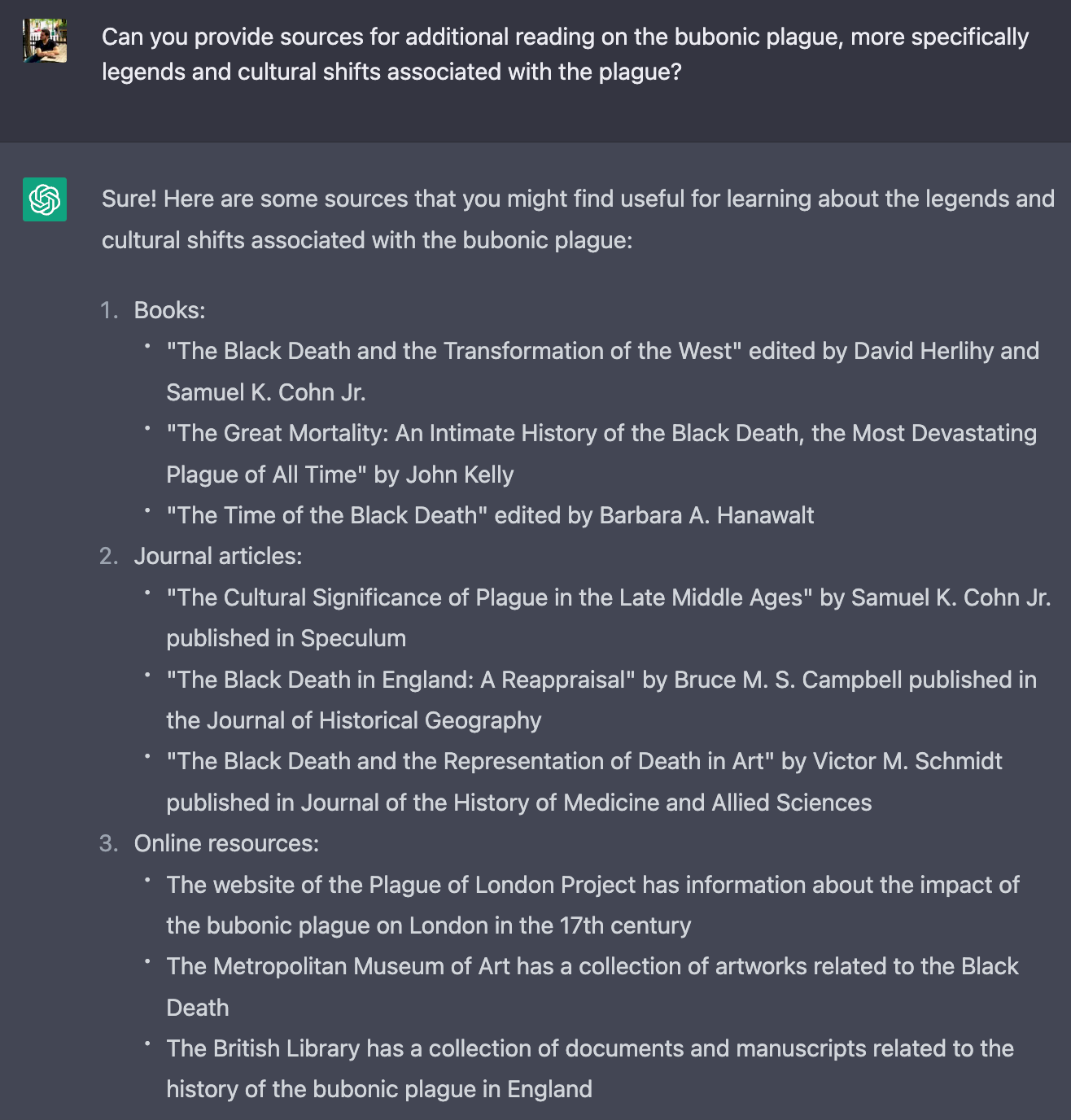I’m not entirely sure where my ideas for short stories actually come from, but I sometimes imagine them forming, like saplings, in the further reaches of my mind while I consume whatever flavour of media the algorithm has decided to sate my curiosity with today.
So when I wonder where my idea for my next short story came from, I honestly cannot say. I’ve always held some fascination in the Black Death (I mean, with the long strings of lockdowns behind us only now fading into obscure memory) but never really thought it to be a topic worth pursuing until recently. And yet, I do not know where this idea for this story in particular came from.
It could be the video game Pathologic 2, a macabre, biting commentary on a plague ripping through a fictional, arcane village on the Eurasian steppe. It could be from Bloodborne, a similarly curious look into the powerlessness of human beings against haunting Lovecraftian deities… and a plague, which try as we might, cannot be killed with sword and axe. Could be the recent pandemic rearing its ugly head. Could be that The Last of Us is a very popular TV show right now that I should catch up on. Could be any number of things.
But here’s my new obsession, and its led to some pretty intense research going into it all. I usually lunge into my stories and do the research once I’ve entered the real meat of the plot, expecting the writing process itself to expose the flaws in my knowledge of whatever topic or period I am writing in. For instance, a recent story contained a Korean-Canadian protagonist and as such required some research into the experiences of Korean immigrants in Canada, the origins of Budae Jigae or Army Stew, etc. I didn’t have it planned out at the start, but these details improve the quality of every work. There’s a reason our minds see ‘Adam went to Walmart‘ as better composed than ‘Adam went to the store.’ It feels like more effort, however minute, was used to craft the sentence.
So when dealing with a somewhat realistic tale set in 14th Century Italy, and involving the legendary Black Death that scoured the continent and changed the world forever, one could say doing at least a respectable chunk of research was the appetizer it deserved.
I started my research as one does nowadays: On Wikipedia. From there I moved on to documentaries and articles written by people with three little letters after their names, before finally settling on academic papers. I didn’t expect to get quite so much enjoyment out of the experience, and what has started as self-imposed necessity became an enlightening foray into a period we know surprisingly little about. And that which we do know is somber at best and ideally ingested in small doses.
Sidenote: Did you know that flagellants apparently wandered between some villages in Italy and essentially flayed their own backs with chains as a way to, in their eyes, prostrate themselves before God and save the country from the disease?
As you can imagine, this parade accomplished little by way of slowing the spread of the disease. In fact, many of these flagellants caught the plague and carried it from village to village instead.
The road to hell is paved with good intentions. The chains were likely a fitting touch too.
Anyway, at some point I got to a very interesting conundrum: I’d done plenty of research on the time, but I was getting carried away. I’d written a rudimentary outline for how I wanted the story to go, who the characters were and what primary themes I’d try my best to carry through. I’d decided, at a high level, on nationalities, medical concepts, location, motifs… I’d even gotten carried away and figured out which university one of the story protagonists would have logically attended to have the knowledge that they did.
And scour it all I did, for I found medieval medicine to be a strange thing. Such as how John of Rupescissa essentially started the distinction between Alchemy and what we know as modern Chemistry through his attempts to create the elusive Philosopher’s Stone1. Or how common belief at the time was that all people had four ‘Humours‘, or ‘principal fluids’, which were black bile, yellow bile, phlegm, and blood, which must be in balance for an individual to maintain good health2. Or how herbal remedies were believed to have antiseptic properties and could be used as a poultice on the buboes (the swellings caused by bubonic plague) and were often made from a crushed mix of rose petals, oil, honey, and egg whites34. Ineffective at best due to their rudimentary knowledge of the disease, but an interesting first attempt at what we now know as chemical cocktails.
But then came a question I couldn’t readily answer:
Imagine a 14th century physician had our modern knowledge of the bubonic plague — how it spreads, how it manifests, remedies, vaccines, potential cures, etc. Could they have cured the plague with only the tools and medicines available to them at the time?
I’ll admit, I had no idea. I figured I knew the unfortunate answer, of course, but it would have taken hours of research to come up with a satisfying conclusion, and likely even longer if I wanted to know the extent of the physician’s ability to at least alleviate the plague. I’m not a lazy person, especially when it comes to research, but some things really do feel like fruitless endeavours when the reward is comparatively minor when matched against the effort necessary to achieve it.
Enter ChatGPT.
I’m not going to spend several paragraphs explaining this new fancy toy that 95% of you have already heard of, so I’ll summarize it in a few sentences: It’s a large-language model AI that is now publicly available. Said model takes in inputs from the user and responds to their query. Queries can range from having the model to write a poem about why Jesus was the greatest rapper in history to asking it about how to create a simple landing page for your startup that’s totally gonna make $10M ARR in its first year, bro.
Anyway, I decided to prompt the AI with a series of questions that I hoped would satisfy this query. In fact, I gave it a prompt that was almost word-for-word what I wrote above. Here is the result of that initial string of queries:
So let’s break down this first set of responses.
A physician at the time would not have had the necessary understanding of plague available to properly treat the disease, and would have essentially gone with whatever processes and treatment options they knew that would alleviate the outward-facing symptoms instead of trying to actually cure the infection. This lines up with common understanding of plagues at the time, which were not seen as a disease that moves through specific means of travel (airborne, waterborne, rodents, etc.) but as something that simply spread through any means available. Jews were burned for poisoning wells for a reason, even if it is unlikely that the bubonic plague really spread through such means.
And then… bleeding and purging. Leeches and vomiting, essentially. Funny enough, the latter might have been effective for medieval food poisoning and stomach irritants that often occurred when knowledge of germs was low and food prep wasn’t done in gloves, but the former? Doubtful. It makes sense why such practices were common, considering the Humours I mentioned earlier, but sadly all ineffective at best and actively harmful at worst.
So then I decided to have some fun: What if these physicians had modern knowledge of the plague and did try to alleviate the symptoms based on that knowledge?
Well, this was more interesting: Alleviating the disease would have been possible, especially if the goal was to improve the condition of the patient so their body could fight the infection. In fact, even some of the more obvious suggestions above like cleaning and dressing the buboes (the big, black boils by which the plague gets its popular name) and giving someone clean water in lieu of warm ale would have given them more of a fighting chance, yet were not commonplace due to the limited knowledge of good medical practices across Eurasia at the time.
I didn’t know that willow bark apparently helps reduce fever and acts as a mild painkiller. Did you?
So to end things off, besides the fact that ChatGPT gave me a very thorough and interesting idea of how someone with only rudimentary tools at their disposal would attempt to combat the Black Death, it also gave me a sobering perspective:
Imagine knowing your enemy, the disease you are trying to cure, and knowing that methods will one day exist to fight it… but do not, today. Today, and for the rest of your years, and for centuries to come, you are powerless.
The physician would not have been able to cure the disease with the tools and medicines available to them at the time.
Imagine that terror. That knowledge that there was nothing at all that Europe could have done to actively prevent the catastrophic number of bodies being thrown into mass-graves. That the only even marginally effective method of stopping the spread was to quarantine the infected, something that of course barely happened and often only after the casualties were mounting and the dead were littering the streets.
I mean, shit, we can’t even quarantine now. Imagine the spread of information back then, and the prevailing belief in plagues being that they were sent by god. The flagellants in the streets said that by cleansing the self of sin, the disease would pass them by. And then they, too, started to die. I wonder if it only made them whip themselves harder.
But all the bloodletting in the world won’t stop what a single flea can start.
And then it gave me recommended readings.
And it provided those readings in different formats, alongside succinct summaries for some. Pretty cool. Time will tell if I ever read any of the ones you gotta pay money or sail the high seas for.
Anyway, hope you enjoyed my dive into using ChatGPT as a way to give myself insightful writing material and existential dread! It’s not likely that my next short-story will be based on the research I’ve done here, but that’s more because I need some time to get into other aspects of the plot. Locations, historical references, realistic depiction of the times, and all that other good stuff.
Till next time, eh?








I ended up writing this story!
https://houseoffiends.medium.com/gods-homunculi-882cf88c2b9b